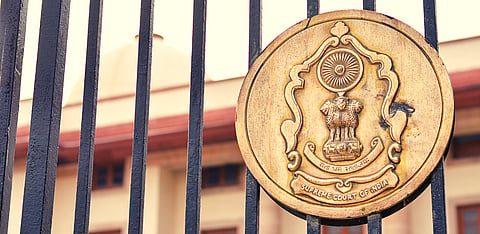

A three-judge Bench led by the Chief Justice of India indicated yesterday that it might refer the petition challenging the presidential Ordinance on Delhi's "services" to a Constitution Bench. The court will disclose its decision on the same on Thursday.
—
THE Supreme Court may refer to a Constitution Bench a petition challenging the presidential Ordinance through which the Centre took control over the "services" of the Government of the National Territory of Delhi (GNCTD).
"We are inclined to refer it to a Constitution Bench," the Chief Justice of India (CJI) Dr D.Y. Chandrachud said yesterday, presiding over a Bench which also comprised Justices P.S. Narasimha and Manoj Mishra.
The matter is posted for further hearing on Thursday.
The said Ordinance was issued merely eight days after a Constitution Bench of the Supreme Court held that the Delhi legislative assembly's power to make laws extends to all subjects in the State List of the Seventh Schedule of the Constitution, except public order, police and land— subjects expressly excluded from its jurisdiction by Article 239AA of the Constitution.
The Ordinance specifies that the Delhi legislative assembly's power to make laws shall not extend to Entry 41 (state public services; state Public Service Commission) of the State List of the Seventh Schedule of the Constitution, or any matter connected therewith or incidental thereto.
This rule shall apply "notwithstanding anything contained in any judgement, Order or decree of any Court," the Ordinance states.
"They (effectively) amended the Constitution by using the powers under 239AA to take services out of the domain of the legislative assembly and bring them within the Central control exclusively. Is that permissible?" the CJI pondered.
The Solicitor General of India (SGI) Tushar Mehta did not oppose the Bench's considerations on referring the matter to a Constitution Bench, but asked it to take notice of the Parliament's powers with respect to the National Capital Territory of Delhi, as enumerated in Article 239AA.
Senior advocate Harish Salve, appearing for the lieutenant governor, also did not oppose the Bench's contemplation of referring the matter to a larger Bench.
Dr Abhishek Manu Singhvi, appearing for the GNCTD, opposed the idea, stating that all questions about the legality of the Ordinance can be answered by the Supreme Court's May 11 judgment on GNCTD's "services".
"I will make a one-sheet note on why it need not be referred," Dr Singhvi told the Bench.
Under clause 3(a) of Article 239AA, the Delhi legislative assembly (provided for by Article 239AA 2(a) of the Constitution) is permitted to make laws with respect to any of the matters contained in the State List or the Concurrent List (except for public order, police and land) of the Seventh Schedule of the Constitution.
However, as clause 3(b) declares, nothing contained in the above clause shall derogate the powers of Parliament to make laws with respect to any matter for a Union territory.
Additionally, as per clause 7, the Parliament has the discretion to make provisions which may supplement Article 239AA, Mehta added.
Clause 7 also prescribes that any such supplementary provision shall not be deemed to be an amendment of the Constitution for the purposes of Article 368 (Power of Parliament to amend the Constitution) notwithstanding that it contains any provision which amends or has the effect of amending the Constitution.
On this, the CJI asked the appearing senior counsels, "In the process of supplementing, can you amend the Constitution?"
During the previous hearing of the matter on July 10, the GNCTD urged the court to impose an interim stay on the Ordinance, which the Bench said it will consider on July 17, yesterday.
Dr Singhvi had asked the Bench, "Can your Lordships imagine a meeting where a chief minister sits in a minority?" referring to the creation of the National Capital Service Authority comprising the chief minister, the chief secretary and the principal home secretary of the GNCTD.
In essence, the GNCTD's argument is that since the latter two members of the authority are Union government appointees and all matters are to be decided by a majority of votes, this effectively gives the Union government a significantly greater say in the appointment of civil servants.
It may be noted that the authority will hold power to recommend the transfers and postings of certain high ranking civil servants and will recommend names to the lieutenant governor, in whose name the officers will be officially appointed.
The changes were made by amending the Government of National Capital of Delhi Act, 1991.
The amendments were justified stating that "any decision taken or any event in the capital of the nation not only affects the residents of the national capital but also the rest of the country and at the same time has the potential of putting the national reputation, image, credibility and prestige at stake in the international spectrum."
Dr Singhvi sought to bring the court's attention to the parts of its May 11 judgment which stressed on the principles of democracy and federalism.
"What are the pillars on which the (Supreme Court's) judgment was based? Civil service accountability to the executive, federalism and decentralisation, and a democratic government," Singhvi had said.
On July 17, the Supreme Court will decide whether the current three-judge Bench will continue hearing the matter or refer it to a Constitution Bench.